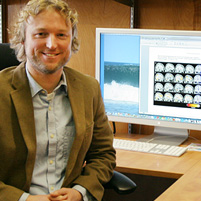Benefits of Self-Affirmation


David Creswell
It's no secret that stress increases your susceptibility to health problems. But did you know it also impacts your ability to solve problems and be creative?
Research from a team led by Carnegie Mellon University's David Creswell found that people can boost their ability to solve problems under pressure by using self-affirmation.
Published in PLOS ONE, it's the first evidence that self-affirmation — the process of identifying and focusing on one's most important values — can protect against the damaging effects of stress on problem-solving performance.
The findings will help guide future research and the development of educational interventions.
"An emerging set of published studies suggest that a brief self-affirmation activity at the beginning of a school term can boost academic grade-point averages in underperforming kids at the end of the semester," said Creswell, assistant professor of psychology in CMU's Dietrich College of Humanities and Social Sciences. "This new work suggests a mechanism for these studies, showing self-affirmation effects on actual problem-solving performance under pressure."
Creswell and his research team had college students rank-order a set of values (e.g., art, business, family and friends) in terms of their personal importance, and indicate their levels of chronic stress.
Participants randomly assigned to a self-affirmation condition were asked to write a couple of sentences about why their number one ranked value was important (a standard self-affirmation exercise). All participants then had to complete a challenging problem-solving task under time pressure, which required creativity in order to generate correct solutions.
The results showed that participants who were under high levels of chronic stress during the past month had impaired problem-solving performance. In fact, they solved about 50 percent fewer problems in the task. But notably, this effect was qualified by whether participants had an opportunity to first complete the self-affirmation activity.
Specifically, a brief self-affirmation was effective in eliminating the deleterious effects of chronic stress on problem-solving performance, such that chronically stressed self-affirmed participants performed under pressure at the same level as participants with low chronic stress levels.
"People under high stress can foster better problem-solving simply by taking a moment beforehand to think about something that is important to them," Creswell said. "It's an easy-to-use and portable strategy you can roll out before you enter that high pressure performance situation."
In addition to Creswell, the research team consisted of Janine M. Dutcher, who participated as a Carnegie Mellon undergraduate student and is now at UCLA; William M. P. Klein of the National Cancer Institute; Peter R. Harris of the University of Sheffield; and John M. Levine of the University of Pittsburgh.
Related Links: Dietrich College of Humanities & Social Sciences | Dept of Psychology | Stress and Coping | Mindfulness Meditation
